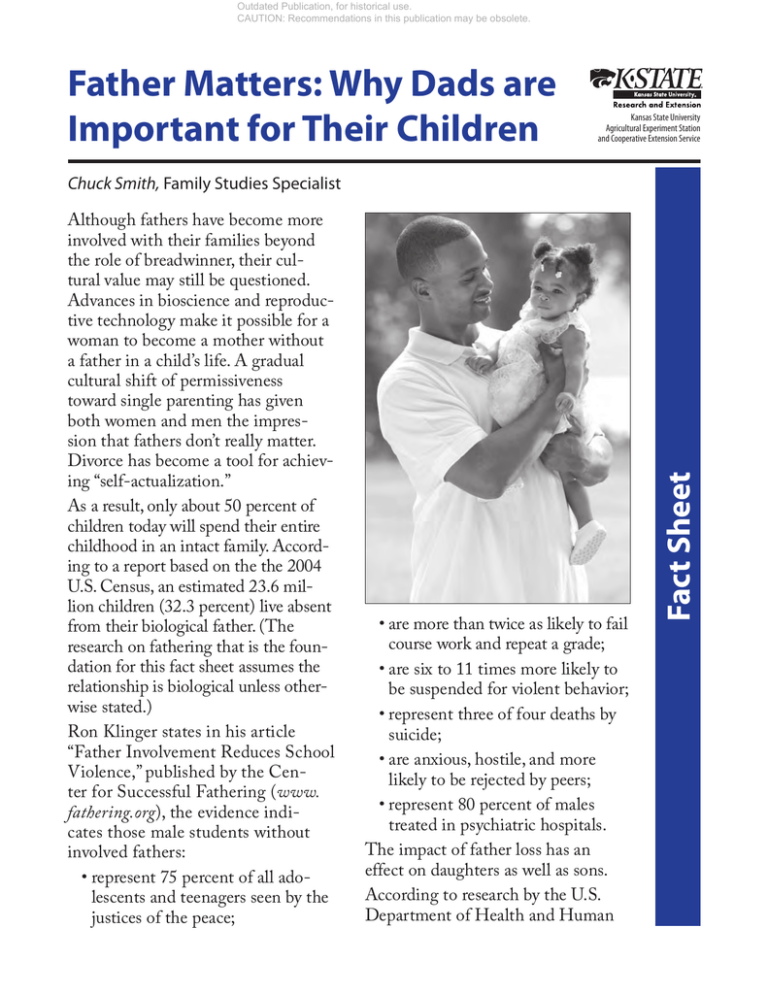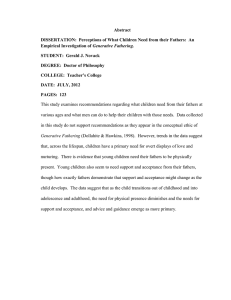
Outdated Publication, for historical use.
CAUTION: Recommendations in this publication may be obsolete.
Father Matters: Why Dads are
Important for Their Children
Kansas State University
Agricultural Experiment Station
and Cooperative Extension Service
Although fathers have become more
involved with their families beyond
the role of breadwinner, their cultural value may still be questioned.
Advances in bioscience and reproductive technology make it possible for a
woman to become a mother without
a father in a child’s life. A gradual
cultural shift of permissiveness
toward single parenting has given
both women and men the impression that fathers don’t really matter.
Divorce has become a tool for achieving “self-actualization.”
As a result, only about 50 percent of
children today will spend their entire
childhood in an intact family. According to a report based on the the 2004
U.S. Census, an estimated 23.6 million children (32.3 percent) live absent
from their biological father. (The
research on fathering that is the foundation for this fact sheet assumes the
relationship is biological unless otherwise stated.)
Ron Klinger states in his article
“Father Involvement Reduces School
Violence,” published by the Center for Successful Fathering (www.
fathering.org), the evidence indicates those male students without
involved fathers:
•represent 75 percent of all adolescents and teenagers seen by the
justices of the peace;
•are more than twice as likely to fail
course work and repeat a grade;
•are six to 11 times more likely to
be suspended for violent behavior;
•represent three of four deaths by
suicide;
•are anxious, hostile, and more
likely to be rejected by peers;
•represent 80 percent of males
treated in psychiatric hospitals.
The impact of father loss has an
effect on daughters as well as sons.
According to research by the U.S.
Department of Health and Human
Fact Sheet
Chuck Smith, Family Studies Specialist
Outdated Publication, for historical use.
CAUTION: Recommendations in this publication may be obsolete.
Services, fatherless children are twice
as likely to drop out of school.
A Bureau of Justice Statistics study of
13,986 women in prison showed that
more than half grew up without their
fathers. Forty-two percent grew up
in a single-mother household, and 16
percent lived with neither parent.
A 1994 report published in the Journal of Marriage and Family found that
adolescent females between the ages
of 15 and 19 reared in homes without
fathers are significantly more likely to
engage in premarital sex than those
reared in homes with both a mother
and father.
Father Benefits
2
Not all men make good fathers.
Children can be better off without
disinterested or abusive men of any
kind in their lives. When children are
separated from fathers, there is a loss
and a cost. Loving father figures such
as stepfathers or grandfathers can offset this cost. But they cannot replace
biological fathers. A child’s mother
cannot replace the father. Children
need the balance of a mother and a
father. Is America losing its balance?
What do involved fathers do?
•They support the child’s mother
and share the challenging workload of raising children.
•They provide financial support to
provide the resources the mother
and children need.
As important as these contributions
are, anyone can make them. Although
it may not seem politically correct,
biology does matter. The deep emotional attachment of a biological
parental connection strengthens the
Outdated Publication, for historical use.
CAUTION: Recommendations in this publication may be obsolete.
relationship and provides stability and
security that enables children to succeed in a challenging world.
Fathers establish a profound relationship with their children that nurtures
them emotionally and physically. No
one else, regardless of how noble their
intentions or how wonderful they
might be, can replace a child’s father.
Grandfathers can come close, but
even they cannot fill the gap completely. Having a mother and father
responsible for bringing them into
the world is life affirming.
Call to Action
Here are seven things you can consider to support fathers in your
community.
1. Understand fathers are import but
recognize and affirm the heroic
efforts of mothers and others who
seek to bring a nurturing male
influence into the lives of children
whose fathers are absent.
2. Speak up about the importance
of biological fathers and encourage dads to become Championship
Fathers at www.fathers.com. This
movement is characterized by men
who commit to fulfilling their commitment to love their children, coach
their children, model for their children, encourage other children, and
enlist other dads to join the team.
3. Promote responsible fatherhood in
your community. Young unmarried
men who may be sexually active
should understand the lifetime
distress their absence will have on
children who might be conceived.
4. Become aware of how fathers are
portrayed in the media. How would
you grade the impression the media
give young people about what it
means to be a father?
5. Listen to About Dads Radio, a podcast series for both men and women
about the importance of fathers at
www.aboutdadsradio.com.
6. Join with others in your community to offer events that celebrate
fathers. The National Center for
Fathering, for example, holds
“Father-Daughter Summits”
throughout the country.
7. Visit five great websites and learn
more about fathers:
•www.ksfatherhood.org
•www.fathers.com
•www.fathering.org
•www.fatherhood.org
•www.fatherhood.gov
Author
Charles A. Smith, Ph.D.
Professor, School of Family Studies
and Human Services
Kansas State University
casmith@ksu.edu
3
Outdated Publication, for historical use.
CAUTION: Recommendations in this publication may be obsolete.
Brand names appearing in this publication are for product identification purposes only. No endorsement is intended, nor is criticism implied of similar products not mentioned.
Publications from Kansas State University are available on the World Wide Web at: www.ksre.ksu.edu
Publications are reviewed or revised annually by appropriate faculty to reflect current research and practice. Date shown is that of publication or last revision.
Contents of this publication may be freely reproduced for educational purposes. All other rights reserved.
In each case, credit Chuck Smith, Father Matters: Why Dads are Important to Their Children, Fact Sheet, Kansas State University, July 2010.
4
Kansas State University Agricultural Experiment Station and Cooperative Extension Service
MF2923 July 2010
K-State Research and Extension is an equal opportunity provider and employer. Issued in furtherance of Cooperative Extension Work, Acts of May 8 and June 30, 1914, as amended.
Kansas State University, County Extension Councils, Extension Districts, and United States Department of Agriculture Cooperating, Gary Pierzynski, Interim Director.



